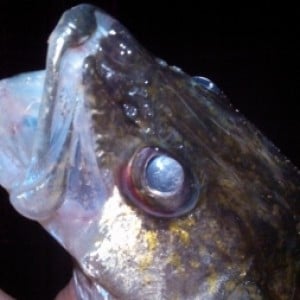Quick question. Is it better to have your electronics on your boat (fish finder) hooked up to your trolling motor batteries or your starter battery? I have my own belief but want to hear your thoughts. Thanks
IDO » Forums » Fishing Forums » General Discussion Forum » Boat electronics wiring
Boat electronics wiring
-
August 15, 2016 at 8:02 pm #1634216
Starter battery. Sonar/finders are hyper sensitive to voltage drops and go whacky. Trolling motor batteries get too much drawdown during the day.
August 15, 2016 at 8:19 pm #1634219The BEST is to have a totally separate battery for electronics. But that isn’t always possible.
Otherwise the best I have found is using one of my trolling motor batteries. In my experience the main motor causes a huge drawdown at startup and can cause the units to shutdown. As well as the feedback caused by the alternator can cause a lot of feedback on the screen. I only have noticeable feedback when the trolling motor is near high, and that is rare.
I have never had an issue connected to a trolling motor battery.August 15, 2016 at 9:06 pm #1634224Hard wire directly to the starting battery with a fuse on the positive side. You won’t get draw down when you start the motor like you do when wired into the fuse box. What is your belief???
August 15, 2016 at 9:12 pm #1634225I have not have the exact same issues as those mentioned. Never had any issues with it hooked up to the starter battery as far as the unit to shutdown or have static feedback from the alternator. However I have had issues. Got the boat and after sitting for a month or less the starting battery was drawn down to not even turning the engine over. Further forensics pointed at the locater/GPS unit drawing even though everything was shut off. It’s an older Lowrance unit…easy resolution is to unplug and remove the unit which I would do anyway depending on where I have it parked. Sometimes in the water at a marina. Anyway…there are most likely other options but that’s my…:!:
August 15, 2016 at 9:19 pm #1634226Forgot to mention, I do have a on/off switch wired in so the GPS doesn’t draw on the battery when not in use
August 15, 2016 at 9:21 pm #1634227The older Lowrances have a known issue where they turn on by themselves. Something with a circuit board that has gone bad.
 Jonesy
Posts: 1150August 15, 2016 at 11:21 pm #1634257
Jonesy
Posts: 1150August 15, 2016 at 11:21 pm #1634257Both humminbird and lowrance would tell you to wire it into a fuse block and make sure the fuse block is properly wired to the starting battery.
You can run it to the starting battery with an inline fuse and it will work and that used to be the industry standard until recently. Running it to the trolling motor batteries is asking for issues.
 hnd
Posts: 1585August 16, 2016 at 9:01 am #1634297
hnd
Posts: 1585August 16, 2016 at 9:01 am #1634297starter battery. always the starting battery. i have a fuse block off my starter battery that is connected to all my fuses for lights, depth finders, and what nots.
 Aaron
Posts: 245August 16, 2016 at 9:55 am #1634307
Aaron
Posts: 245August 16, 2016 at 9:55 am #1634307Cranking battery. I use an AGM because they hold a charge so much better and last a lot longer.
 Ripjiggen
Posts: 13286
Ripjiggen
Posts: 13286 TumaInactiveFarmington, MNPosts: 1403August 16, 2016 at 10:47 am #1634325
TumaInactiveFarmington, MNPosts: 1403August 16, 2016 at 10:47 am #1634325I have always wired it to the starter battery with a fuse. If you are worried about power draw when you are not using the unit or when storing the boat, one can always add a switch to cut the power.
 CaptainMusky
Posts: 25396August 16, 2016 at 10:48 am #1634326
CaptainMusky
Posts: 25396August 16, 2016 at 10:48 am #1634326Starting battery or if you are lucky and have the funds and space a separate dedicated battery solely for electronics and nothing else.
I have mine connected to the starter battery through my main circuit block with Master Power switches.
This way there is no chance of the units turning on by themselves without the master power ON.
I don’t have the problem of them turning off when starting the big motor because I installed a much larger dual purpose battery which runs the outboard and all of the other electrical internals on the boat.
If I went with a deep cycle I suppose it would be better yet, but no need for me at this point. Plus I was hesitant to use a deep cycle where the outboard was connected because of the huge amp draw and charge cycles of the outboard. From my experience that isn’t a good idea, but I know others do it.August 16, 2016 at 11:17 am #1634333Electronics should be run off the starting battery because the power draw and “run dead” tendencies of the trolling motor batteries produce lots of problems for sensitive electronics like depth finders and GPS.
But even more important is HOW electronics are connected to the battery.
1. Starting from the battery you should have a main power feed that leads to a fused terminal block. This allows you to connect devices to the terminal block easily and each device is protected by a fuse.
2. The wire from the battery to the block AND the wire from the block to the individual device MUST be sized properly!
I see the mistake of using undersized wire time and time again. I always use the +1 size rule, I calculate the required current draw of the device and then use the next higher wire gauge size, so for example if the device and the wire run require 16 gauge wire, I upsize and use 14. The increased wire gauge prevents all kinds of issues and just makes life easier.
3. Install a cutoff switch between the electronics fuse block and the battery. Personally, I use the master A/B/Both switches on all my boats so then I have a master off that shuts down all electronics on the boat.
4. Use proper, marine-grade wire connections and hardware. Vibration and moisture are the bane of all marine electronic connections. NEVER use wire nuts or “snap on” type connectors. All wire connections and terminal ends should be marine grade with heat shrink ends or have heat shrink wrap applied over the top.
It takes WAY less time to do things right the first time than it does to chase endless electronic gremlins down the road when you’d rather be fishing.
Grouse
 nhammInactiveRobbinsdalePosts: 7348August 16, 2016 at 11:19 am #1634334
nhammInactiveRobbinsdalePosts: 7348August 16, 2016 at 11:19 am #1634334I hooked my helix 5 on the bow TM and to battery up front for the TM exclusively, haven’t had any issues.
 tim hurley
Posts: 6057August 16, 2016 at 3:12 pm #1634401
tim hurley
Posts: 6057August 16, 2016 at 3:12 pm #1634401Grouse can we assume that the wire provided by HBird is the right gauge?
August 16, 2016 at 3:34 pm #1634411Grouse can we assume that the wire provided by HBird is the right gauge?
not Grouse, but for a very short run the 24awg that H’bird uses is OK, but I tend to shorten the original harness as much as possible, and use #14 or 16 to the battery or fuse box.
HRG
August 16, 2016 at 11:25 pm #1634476Grouse can we assume that the wire provided by HBird is the right gauge?
No.
Wire size is determined by load and distance of the run. I check everything. The wire provided may or may not be adequate depending on gauge and length.
Grouse
August 17, 2016 at 9:58 am #1634534Number of connections and/or splices can also play a apart. Even inline fuses can cause voltage drop. I like short and straight to a fuse block.
You must be logged in to reply to this topic.